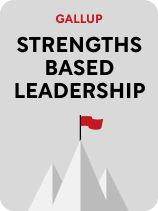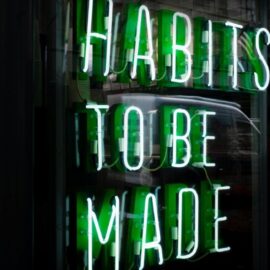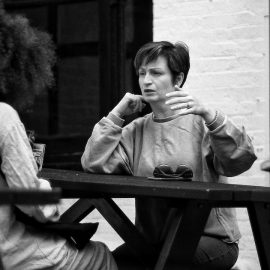
What’s Gallup’s leadership philosophy? What are the best Gallup strengths for leaders?
Gallup is a business research and consulting company that Strengths Based Leadership by Tom Rath and Barry Conchie bases most of its research on. Their book lists four strengths that leaders should capitalize on based on their innate talents, with the help of a well-balanced team to fill in the gaps.
Keep reading to learn more about the best Gallup strengths for leaders.
Know Your Strengths and Stick to Them
Along with the best Gallup strengths for leaders, Gallup research concludes that all good leaders know their strengths and apply them well. By doing this, you’ll be able to proficiently execute the tasks you’re skilled at without causing trouble in areas you aren’t well-suited for. In contrast, if you don’t know your strengths and weaknesses, your team may suffer for it. For example, something you think you do well you might actually do poorly, which can create more problems than help for your team. Thus, a lack of self-awareness can cause your employees and customers to be unhappy and stressed.
(Shortform note: It’s especially important to know your strengths and weaknesses when you’re a leader in a hierarchical organization. In Leadership Strategy and Tactics, Jocko Willink explains that one of his superiors in the military occupied a leadership position he wasn’t effective in. Because of the military’s strict hierarchy—and because the leader wasn’t open to other people’s advice—other team members weren’t able to compensate for the leader’s weaknesses. So although Willink argues that people with good leadership qualities naturally tend to rise to leadership positions, he acknowledges that institutional chains of command often prevent this from happening.)
How Gallup Defines Strengths and Why Strengths Matter
Conchie and Rath explain that leaders commonly mistake strengths in the workplace as lengthy experience or trained competence in a certain area. As a result, leaders often overlook the potential impact of individuals’ positive personality traits and natural talents, which are more critical when crafting a successful team. For example, if you’re hiring someone for your sales team based solely on their sales experience, you might neglect that another candidate with less experience also has great relationship skills that could get your sales team to work better together.
Moreover, Gallup research shows that when a leader fails to invest in an employee’s strengths, that employee has only a 9% chance of being engaged with their work. On the other hand, when a leader recognizes their employee’s strengths and encourages these, the employee has a 73% chance of being engaged. The authors say encouraging strengths is critical because high employee engagement has been shown to increase the likelihood of their respective company’s success and improve team members’ individual well-being. That’s in part because being aware of your strengths increases your confidence, which leads to better job satisfaction, income, and health. On the other hand, focusing on weaknesses will lower your team’s confidence and performance.
The authors categorize people’s natural strengths into four themes: executing, relationship-building, influencing, and strategic thinking.
Strength #1: Executing
People who execute can bring ideas to fruition, doing whatever it takes to get something done. There are a variety of qualities someone may have that help them excel in this category. For example, they may possess discipline to help them stay on track toward a goal, a sense of personal pride in working hard and achieving things, or a sense of responsibility for their team’s success.
To demonstrate what an executor looks like in action, the authors share the success story of Wendy Kopp, founder of an education-focused nonprofit called Teach For America. Kopp exemplifies the executing theme with her dominant characteristics of achievement and responsibility. After realizing the lack of quality education available to underprivileged children in the US, Kopp felt a personal sense of responsibility to create education opportunities. She worked persistently to organize a team of talented people and has now gathered hundreds of millions of dollars in funding.
Strength #2: Influencing
A person who influences can get others on board with their ideas. They possess qualities such as confidence, persuasion, and the ability to impress others. For example, you may exude so much confidence when you step up to take control of a project that your team feels convinced you’re capable of succeeding, so they support you. To convince people who aren’t as easily swayed, you may have an instinct for knowing what team members or clients want to hear or see to help you get through to them.
For example, the president of the Ritz-Carlton Hotel Company, Simon Cooper, knew his company’s strength was customer service and he capitalized on this to expand its influence. He confidently showed off his team to guests, which won him loyal clients. In one case, he invited the musician, Bono, to accompany him to a meeting with the hotel’s housekeeping staff. Cooper believed so strongly in his team’s excellent service that he broadened the company’s offerings to include private, luxury residences. Although many people questioned this risky expansion of the brand, Cooper’s confidence in his company won him many buyers, and the venture was successful.
Strength #3: Relationship-Building
Relationship-building is what helps your team perform as a cohesive whole. Conchie and Rath characterize this strength with sub-qualities such as optimism and compassion. For example, if you’re a relationship builder, you may be able to keep your team’s spirits up during a difficult day, which ultimately helps them perform better and complete the necessary objective. You’re also able to relate to individuals and mentor them to help them feel included and valuable to the team, which will help them work better together.
We’ll explore what relationship-building looks like by examining the success of Mervin Davies, a former CEO of Standard Chartered. He credits his success to his investment in relationships. In particular, he emphasizes a few relationship-building habits:
1. By communicating honestly and openly with his employees about the decisions he made for his company, he earned their trust, which is essential for good relationships.
2. Davies also trusted his employees by empowering them with responsibility and freedom. By knowing his own capabilities and the capabilities of people around him, he was able to assign people to tasks they’re suited to handle and free himself to do what he does best as an executive, coaching people.
3. By listening to his team, he got to know their strengths and deepened his relationships with them. This way, he knew how to empower individuals on his team more effectively.
Strength #4: Strategic Thinking
Strategic thinkers help their teams grow by analyzing performances and suggesting possibilities for improvement. Conchie and Rath explain that this strength involves being analytical and effective at consultation. For example, if you’re a strategic thinker, you may have an eye for noticing inefficiencies in your team’s performance and formulating an alternative game plan that saves time and increases productivity.
To show what strategic thinking looks like in practice, the authors point to Best Buy’s CEO, Brad Anderson. Anderson started as a sales associate at the Minneapolis-based electronics retailer that would eventually become Best Buy, and as the company grew, he ascended the ranks to CEO. His keys to success are his enthusiasm for learning and ability to ask great questions to uncover critical information. For example, he questioned whether a commission-based sales model was best for their stores, and after surveying customers, he realized this model made customers feel pressured by sales associates. So, he adopted a more relaxed model of browse shopping, where customers could shop fully stocked items at their leisure. This model was widely successful and was adopted by many other retailers soon after.

———End of Preview———
Like what you just read? Read the rest of the world's best book summary and analysis of Gallup, Tom Rath, and Barry Conchie's "Strengths Based Leadership" at Shortform.
Here's what you'll find in our full Strengths Based Leadership summary:
- Why good leaders don't necessarily need to be well-rounded
- Why you should build a diverse team to fill in your weaknesses
- The four qualities of a leader that command respect






